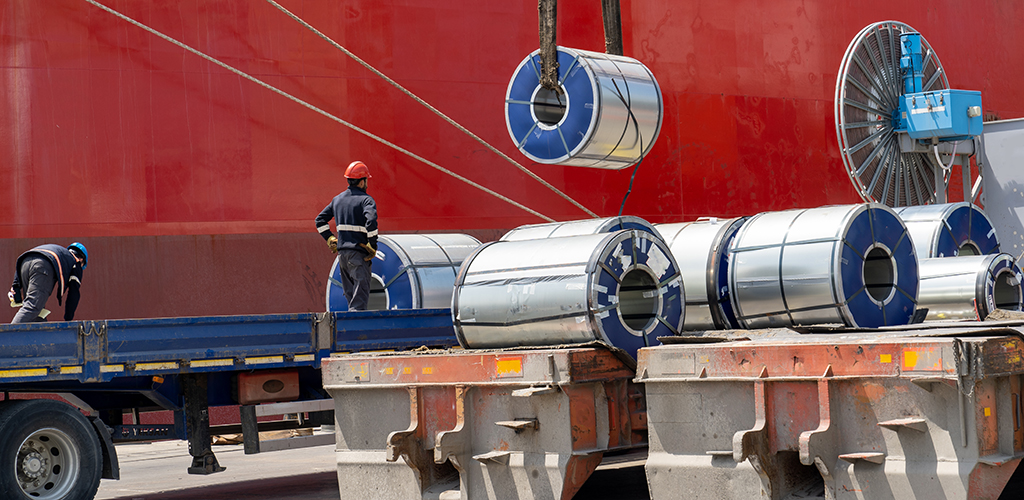John Vogt Presents the Latest in His On-Going Series on Incoterms

_10.png) John Vogt, former Halliburton vice president of global logistics and a visiting professor at the University of Houston-Downtown, presents the latest in his long-running series on Incoterms, the internationally recognized set of trade rules that sellers and buyers must follow when devising a contract for the shipment of goods. This week, John introduces us to the concept of resilience and the importance of selecting the right logistics services providers.
John Vogt, former Halliburton vice president of global logistics and a visiting professor at the University of Houston-Downtown, presents the latest in his long-running series on Incoterms, the internationally recognized set of trade rules that sellers and buyers must follow when devising a contract for the shipment of goods. This week, John introduces us to the concept of resilience and the importance of selecting the right logistics services providers.
New installments are published each month on the Breakbulk news page and in our online BreakbulkONE newsletter.
We have in previous articles discussed risks in a logistics chain. Knowledge of the risks allows you to plan solutions that minimize these risks and thereby make a chain more resilient. At a high level that is true, but for the professional logistician, a greater and deeper understanding is necessary.
Plenty of jargon surrounds the topic of resilience, like ‘robustness’ and ‘agility’ to even having scorecards for resilience. Let’s first try to understand this topic before we employ any special techniques, if they are needed.
We need to acknowledge that an international supply chain has major problems in acquiring data in a timeous manner. Recommendations to use end-to-end data in the international logistics chain for resilience are in the ‘wouldn’t it be nice to achieve’ realm but are not practical today for most international cases. There is value in understanding the full logistics and supply chain so all risks can be identified and assessed. Knowledge of the upstream, not just the direct suppliers, does highlight risks due to their logistics capability, and perhaps their geographical locations.
But for structural or designed resilience, the location and capability would be considered before these suppliers were appointed, and the decision made to leave logistics to them or to perform it by your company. But this is a design process and hence long-term capability. The question remains how to deal with the vicissitudes of trade which must occur!
All this is moot if the company is driven not by a strategic focus, but by minimizing the cost of the logistics chain. Strategic thinking companies will set a service standard for logistics, and then task the logistics chain to be cost effective and efficient. This service standard directly supports the marketing effort. Many companies are focused on a logistics capability driven by cost reductions and inventory reductions to improve operating margins. Unfortunately, these companies are the ones that benefit in the short term and have disasters when adverse conditions occur.
Take one company which demanded a cost reduction of 25% in its logistics costs while believing it could maintain its service standard (which was never articulated or agreed). This award-winning logistics capability deteriorated and within a few years the annual report reflected logistics issues. It is amazing that many companies reported lean supply chains as an advantage, when this drives all resilience to a low level as the inventory and processes have been reduced to the required minimum. Lean works magnificently in a manufacturing center where the work is pre-planned, the production rate does not vary, and the suppliers have time to ensure the required goods are delivered on time all the time for the manufacturing program. Logistics, particularly international logistics, is far from this, so when disruptions happen, the chain is damaged and struggles to recover.
From a logistics viewpoint, the risks need to be identified and mitigated to improve resilience at the design or structural stage. This means choosing alternative carriers or choosing the most reliable carrier rather than the lowest cost. It means choice of logistics service providers must be done with a clear view to improve the capability and quality of the logistics service to meet the service standard at an economic cost over time. As soon as this becomes a short-term perspective, the service standard is no longer the driver, and hence marketing being supported by logistics is no longer valid.
With all this said, we need to understand resilience and what it truly means for a professional logistics capability. We will explore what it really means, and then how to improve a logistics chain in future articles.
Do you have an Incoterms experience to share that you'd like John to comment on and that could be included in a future article? Submit to Breakbulk's Leslie Meredith at [email protected] and include description, locations (origin and delivery), Incoterm used, and lesson learned if applicable.
